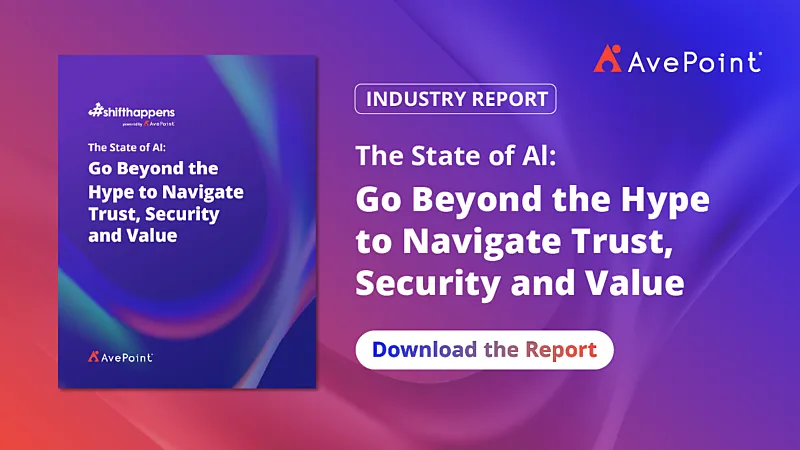The Shift from Hype to Reality
AI has shifted from theoretical potential to practical application, becoming a fixture in how organizations operate day to day. But as adoption accelerates, new challenges emerge. Concerns over data security, inaccurate outputs, and governance gaps are eroding trust at the very moment these organizations are racing to scale.
In a new report from #shifthappens by AvePoint, The State of AI: Go Beyond the Hype to Navigate Trust, Security, and Value, we uncover how global leaders are grappling with these realities. Drawing on insights from 775 business leaders across financial services, healthcare, and government, the report reveals where progress is being made — and where gaps in trust, security, and governance still stand in the way.
The data makes one thing clear: speed alone won’t deliver results. AI success (and safety) depends on stewardship — governance, data quality, and trust. Our findings reveal where organizations are excelling and where they’re falling short. Here are some of the insights drawn from the report that highlight the most pressing challenges and opportunities that matter to leaders right now.
AI Is Causing Real Security Incidents
More than 75% of organizations reported at least one AI-related security breach in the last year. Oversharing sensitive information has proven to be a tangible and costly risk, exposing both employee and customer data. Breaches stem from both external threats and internal misuse, underscoring how widespread the challenge has become.
Why it matters: Traditional information management frameworks were not designed for AI. Native tools alone cannot keep pace with the complexity and sprawl of AI-generated data, leaving organizations vulnerable unless they evolve their governance models.
Data Quality and Accuracy Concerns are Stalling Rollouts
Nearly 86% of organizations have delayed rollouts, with inaccurate outputs (68.7%) and data security concerns (68.5%) being the top obstacles. On average, these delays last about six months, with some organizations facing rollouts stalled up to 12 months — a significant time lost in fast-moving markets.
Why it matters: This isn’t about license costs or employee adoption. The core issue is data. Outdated, irrelevant, or poorly governed data can lead to hallucinations and incorrect outputs — eroding employee trust and decision-making. Without fixing the data foundation, AI initiatives are doomed to stall.
AI Policies are Becoming a Business Imperative
The percentage of organizations that have – or are actively developing – AI Acceptable Use Policies jumped by nearly 80% year over year. Today, 84.5% of organizations either have a policy in place or are actively building one. Leaders are moving from reactive postures to proactive governance, acknowledging that clear guidelines are no longer optional.
Why it matters: Governance is a shared responsibility, but accountability begins inside the organization. As new technologies like agentic AI emerge, policies must be treated as living documents, continuously revised to address evolving risks, opportunities, and use cases.
“It’s crucial to move beyond theoretical security policies and focus on operational implementation. This means every policy must be backed by clear procedures, technical controls, continuous monitoring, and strict enforcement.” - Dana Simberkoff, Chief Risk, Privacy and Information Security Officer
The Return on AI Investment Isn’t Just About Efficiency
Organizations are increasingly measuring AI success through customer outcomes, not just productivity gains. The top two benchmarks are enhancing customer insights and personalization, as well as increasing customer engagement. Yet, many admit there’s a significant gap between what they hoped to achieve and what they have delivered so far.
Why it matters: Too often, organizations track adoption by counting licenses or measuring usage rather than assessing its real impact. However, true ROI comes from how AI improves customer experience, drives resilience, and enables new forms of value creation.
Trust as the New Advantage
AI is at a tipping point. Adoption is mainstream, but execution gaps threaten value in trust. And in this new era, trust has become the ultimate competitive advantage.
Organizations that succeed will be those that treat AI like a core business system. This means embedding governance into daily workflows, continuously evolving policies, and strengthening the quality of data at its foundation.
Explore the Full Report
These four takeaways are only part of the story. The State of AI report delves deeper, offering critical insights for leaders who want to turn AI from a fast-moving experiment into a lasting competitive advantage.
Download the full report to explore all the findings and learn how to make AI work for your organization.



